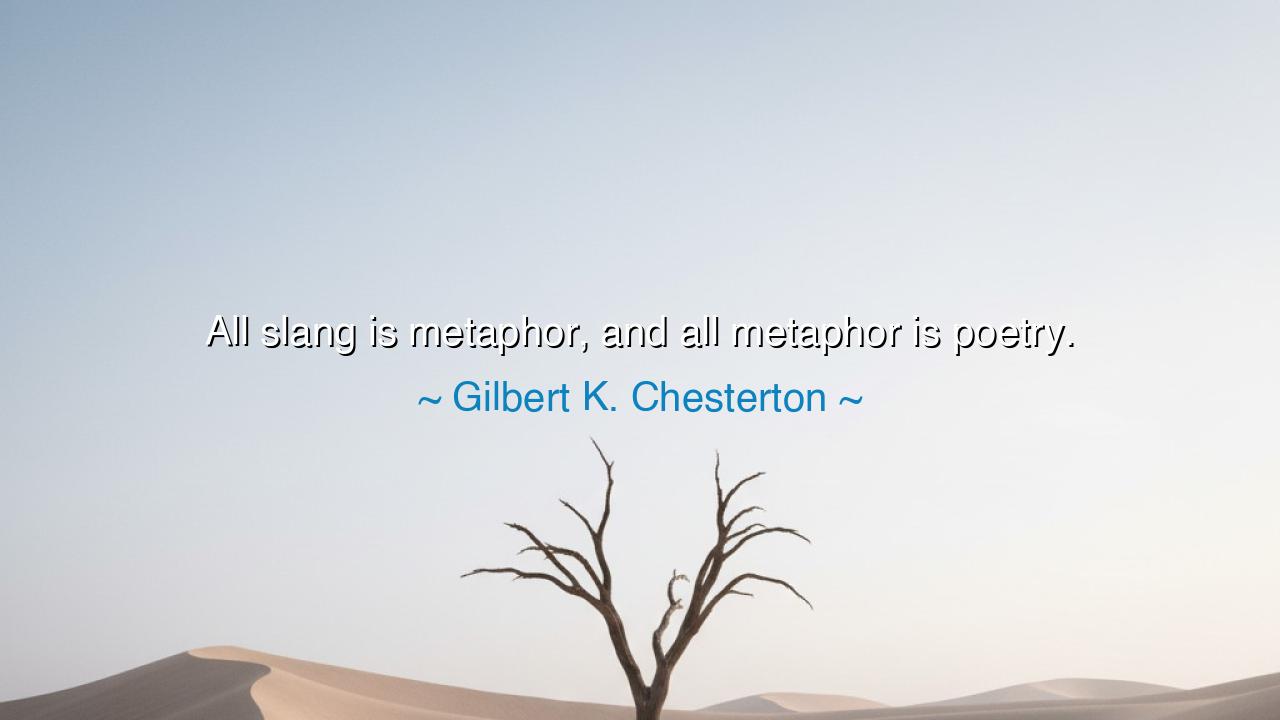
All slang is metaphor, and all metaphor is poetry.






G. K. Chesterton, the paradoxical sage and knight of wit, once proclaimed: “All slang is metaphor, and all metaphor is poetry.” In this dazzling chain of thought, he lifts what many dismiss as crude or common speech and reveals its secret kinship with the loftiest art. For slang, in its rawness, is not mere vulgarity—it is the invention of the people, the reshaping of language into vivid metaphor. And what is metaphor but the very heartbeat of poetry, that noble art by which the unseen is made visible, the abstract given flesh, and the ordinary crowned with wonder?
The origin of this truth lies in Chesterton’s lifelong defense of the ordinary and his reverence for imagination. Living in an age of skepticism and industrial rigidity, he saw how language, like the soul, could grow stale unless infused with fresh vitality. Slang, though scorned by the polite, was for him a fountain of renewal, where the masses, in their humor and instinct, created new images for old truths. When a worker says he is “chained to the desk,” or a soldier speaks of “hell on earth,” these are not mere complaints—they are poetic metaphors, raw jewels unpolished but shining with authenticity.
History itself bears witness to Chesterton’s vision. Consider the English sailors of past centuries, whose rough speech birthed colorful idioms that still endure. “Loose cannon,” once a literal peril on the deck of a ship, became a metaphor for an unstable person. “Spill the beans,” “cut to the chase,” “kick the bucket”—these phrases, born in taverns, fields, and marketplaces, are metaphors crafted not by scholars but by common tongues. And yet, what are they but poetry, smuggled into everyday speech, giving rhythm and image to life’s realities? In their own way, they reveal the same creative force that shaped the Psalms, the epics, and the sonnets.
The meaning of Chesterton’s words reaches beyond language into the very nature of art. Metaphor is the bridge between thought and experience, between the unseen and the seen. When slang coins a phrase, it forges that bridge; when poetry refines metaphor, it elevates it to beauty. But both acts are of the same essence: they transform. The tavern-slang and the poet’s song are brothers, both children of imagination. One speaks in rough cloth, the other in silk, yet both cover the same truth—that man cannot live without creating images to carry his thoughts.
There is also a heroic democracy in Chesterton’s insight. By declaring that slang is metaphor and metaphor is poetry, he proclaims that every person—whether scholar or beggar, sailor or scholar—is, in some small way, a poet. For each time we shape words to reveal more than they literally mean, we participate in the same act that gave us Homer’s epics and Shakespeare’s plays. The line between the common man’s speech and the master poet’s verse is one of degree, not of kind. Thus language itself becomes a testimony to the creative fire burning in every soul.
The lesson here is powerful: honor language, even in its humblest forms. Do not dismiss slang as mere corruption, for within it lies the living pulse of metaphor, the seed of poetry. Instead, listen carefully to the words people invent, for in them you will hear fresh metaphors springing from life itself. The poet, the writer, the thinker must learn from the streets as much as from the libraries, for the people’s speech is a treasury of raw poetry waiting to be refined.
Practically, this means cultivating both attentiveness and reverence. Pay attention to the way people speak in markets, homes, and workplaces, and notice the metaphors hidden in their slang. Write them down, turn them in your mind, and recognize them as sparks of the poetic spirit. And in your own speech, embrace metaphor consciously—not to decorate, but to reveal truth. Speak in images that bring clarity and fire, so that your words become not only communication but creation.
Thus Chesterton’s words ring like a trumpet across time: “All slang is metaphor, and all metaphor is poetry.” Let us see in every phrase, high or low, the eternal fire of imagination. Let us remember that language itself is a great poem, written not only by the masters, but by every tongue that has ever sought to name the world anew. And let us speak, then, with reverence and creativity, so that even our most ordinary words may carry the echo of poetry.






AAdministratorAdministrator
Welcome, honored guests. Please leave a comment, we will respond soon